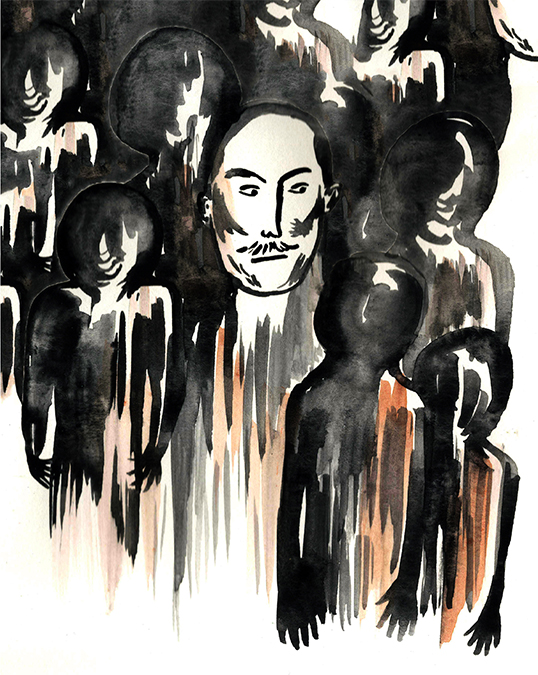Mervin Cecil Frank Sheppard was born on 21 June 1905 in Ireland and was educated at Cambridge University. He sat for the Malayan Civil Services (MCS) Competitive Examination in London in 1927 and arrived in Malaya in 1928 to serve with the MCS until 1963. During World War 2, he served as a Company Commander in the Federated Malay States Volunteer Force (FMSVF) from 1941 until 1942, at which point he became a prisoner of war.
Sheppard was a prisoner of war in Changi internment camp during the Double Tenth incident on 10 October 1943. At that time, the camp had around 2000 to 3000 internees. The Double Tenth incident was a series of arrests and interrogations conducted by the Japanese on civilians and civilian internees. This happened because of the mistaken belief, on the part of the Japanese, that some internees were involved in a sabotage mission on the Singapore Harbour that sunk seven Japanese ships.
After the war, a Commission of Inquiry was instituted by the British military to record evidence of atrocities committed against internees by the Japanese. Sheppard, now holding the rank of Major in FMSVF, was attached to ‘E’ Group, War Crimes Investigation, Singapore and assisted in the investigation of the Double Tenth incident.
Sheppard served as a witness for the prosecution in the Double Tenth Trial or Sumida Haruzoa and others trial. He recounts what happened in the weeks following the Kempeitai’s thorough investigation of Changi internment camp on 9 October 1943, and also gave testimonies regarding his investigation of the Double Tenth incident as part of ‘E’ Group, War Crimes Investigation, Singapore.
Sheppard described that the camp was in a “state of morbid fear”, with the series of raids that saw the Kempeitai thoroughly raiding the camp and interrogating a number of internees. Some internees did not return from the interrogations. Others came back sick or badly wounded, and some died from these wounds soon after. Sheppard gave detailed descriptions of the state that the internees – specifically Fraser, Middlebrook, Penseller, Ker, Haggar, and McIntyre – returned in. These individuals were identified as the victims of the Double Tenth incident during the trial, and Sheppard’s statements aided the court in its findings against the Japanese Kempeitai on trial. While Sheppard was a very cooperative witness, he declined to give an estimate of the number of prisoners who died in the camp connected to the Double Tenth incident, stating that he did not know the amount and did not carry this information in his head, even though he was asked the question multiple times.
Sheppard also testified that Toh Swee Koon, a “Taiwanese Kempeitai” and interpreter for the Japanese, conducted his interrogation “with great patience and in striking contrast to the Japanese”. Toh was subsequently pronounced guilty by the court martial and sentenced to death. This sentence was not confirmed by the Deputy Judge Advocate-General as Toh, a local inhabitant, was not liable to be tried in the military courts.
After the war, Sheppard retired from the FMSVF and stayed on in his job in the civil service until his retirement in 1963. Around this time, Sheppard also converted to Islam and changed his name to Abdul Mubin Sheppard.
He was appointed as the first Public Relations Director in 1946 and the “First Keeper of Public Records”, known today as The National Archive of Malaysia, in 1958. This marked the beginning of his illustrious career as an academic, historian and archivist. He held other important appointments including being the first Director of the National Museum of Malaya, and also became the Assistant Resident and Editor of MBRAS (Malaysian Branch of the Royal Asiatic Society). As the first Director of the National Museum of Malaya, he placed significant emphasis on retrieving Malayan artefacts in order to establish the National Museum. He also wrote several books on the history, tradition, art and handicraft of Malaysia.
Sheppard passed away due to old age on 12 September 1994, at the age of 89. He was given a state and military farewell and was laid to rest at the Muslim Cemetery at Jalan Ampang. In his lifetime, he was awarded various titles and was honoured as Tan Sri Datuk Dr. Haji Abdul Mubin Sheppard. In 1996, the Mubin Sheppard Memorial Prize was established under his name with “the aim of stimulating students' awareness of the need to conserve Malaysia's built heritage and to encourage research and writings on various aspects of conservation and preservation.” Sheppard is remembered as a man who went beyond his call of duty in his work, and made significant contributions towards Malaysia’s national history that are remembered to this day.
Note: This portrait was based on trial transcripts from the UK National Archives, information from the Malaysia National Archives, media reports, and other secondary material. If you have information to share or any queries, please contact the Singapore War Crimes Trials Portal.
Photo credits: Ali, A. (1957). Untitled. [image] Available at: https://www.flickr.com/photos/the1957album/937142240/in/photostream/ [Accessed 24 Jan. 2017]; Sheppard is second from the left
Photo credits: Mubin Sheppard (1905-1994):
Theearlymalaydoctors.blogspot.sg. (2017). Mubin Sheppard (1905-1994). [online] Available at: http://theearlymalaydoctors.blogspot.sg/2011/11/mubin-sheppard.html [Accessed 24 Jan. 2017].

![Photo credits: Ali, A. (1957). Untitled. [image] Available at: https://www.flickr.com/photos/the1957album/937142240/in/photostream/ [Accessed 24 Jan. 2017]; Sheppard is second from the left.](https://singaporewarcrimestrials.com/uploads/portraitgallery/937142240_01e0ec9875_b.jpg)
![Photo credits: Mubin Sheppard (1905-1994):
Theearlymalaydoctors.blogspot.sg. (2017). Mubin Sheppard (1905-1994). [online] Available at: http://theearlymalaydoctors.blogspot.sg/2011/11/mubin-sheppard.](https://singaporewarcrimestrials.com/uploads/portraitgallery/mubin.jpg)